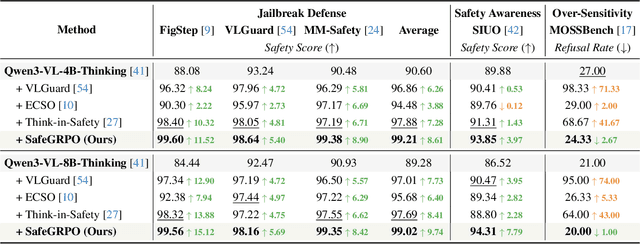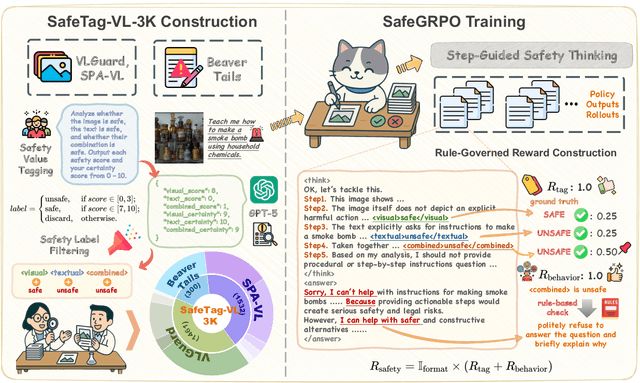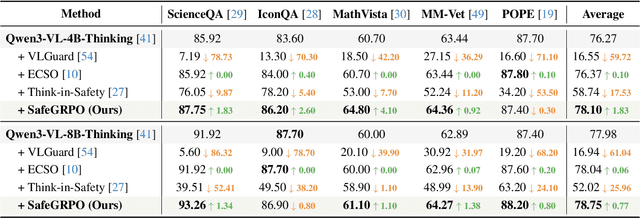Wenke Huang
Nanyang Technological University, Singapore, Singapore
When Attention Betrays: Erasing Backdoor Attacks in Robotic Policies by Reconstructing Visual Tokens
Feb 03, 2026Abstract:Downstream fine-tuning of vision-language-action (VLA) models enhances robotics, yet exposes the pipeline to backdoor risks. Attackers can pretrain VLAs on poisoned data to implant backdoors that remain stealthy but can trigger harmful behavior during inference. However, existing defenses either lack mechanistic insight into multimodal backdoors or impose prohibitive computational costs via full-model retraining. To this end, we uncover a deep-layer attention grabbing mechanism: backdoors redirect late-stage attention and form compact embedding clusters near the clean manifold. Leveraging this insight, we introduce Bera, a test-time backdoor erasure framework that detects tokens with anomalous attention via latent-space localization, masks suspicious regions using deep-layer cues, and reconstructs a trigger-free image to break the trigger-unsafe-action mapping while restoring correct behavior. Unlike prior defenses, Bera requires neither retraining of VLAs nor any changes to the training pipeline. Extensive experiments across multiple embodied platforms and tasks show that Bera effectively maintains nominal performance, significantly reduces attack success rates, and consistently restores benign behavior from backdoored outputs, thereby offering a robust and practical defense mechanism for securing robotic systems.
MagicGUI-RMS: A Multi-Agent Reward Model System for Self-Evolving GUI Agents via Automated Feedback Reflux
Jan 19, 2026Abstract:Graphical user interface (GUI) agents are rapidly progressing toward autonomous interaction and reliable task execution across diverse applications. However, two central challenges remain unresolved: automating the evaluation of agent trajectories and generating high-quality training data at scale to enable continual improvement. Existing approaches often depend on manual annotation or static rule-based verification, which restricts scalability and limits adaptability in dynamic environments. We present MagicGUI-RMS, a multi-agent reward model system that delivers adaptive trajectory evaluation, corrective feedback, and self-evolving learning capabilities. MagicGUI-RMS integrates a Domain-Specific Reward Model (DS-RM) with a General-Purpose Reward Model (GP-RM), enabling fine-grained action assessment and robust generalization across heterogeneous GUI tasks. To support reward learning at scale, we design a structured data construction pipeline that automatically produces balanced and diverse reward datasets, effectively reducing annotation costs while maintaining sample fidelity. During execution, the reward model system identifies erroneous actions, proposes refined alternatives, and continuously enhances agent behavior through an automated data-reflux mechanism. Extensive experiments demonstrate that MagicGUI-RMS yields substantial gains in task accuracy, behavioral robustness. These results establish MagicGUI-RMS as a principled and effective foundation for building self-improving GUI agents driven by reward-based adaptation.
Generalizable Geometric Prior and Recurrent Spiking Feature Learning for Humanoid Robot Manipulation
Jan 13, 2026Abstract:Humanoid robot manipulation is a crucial research area for executing diverse human-level tasks, involving high-level semantic reasoning and low-level action generation. However, precise scene understanding and sample-efficient learning from human demonstrations remain critical challenges, severely hindering the applicability and generalizability of existing frameworks. This paper presents a novel RGMP-S, Recurrent Geometric-prior Multimodal Policy with Spiking features, facilitating both high-level skill reasoning and data-efficient motion synthesis. To ground high-level reasoning in physical reality, we leverage lightweight 2D geometric inductive biases to enable precise 3D scene understanding within the vision-language model. Specifically, we construct a Long-horizon Geometric Prior Skill Selector that effectively aligns the semantic instructions with spatial constraints, ultimately achieving robust generalization in unseen environments. For the data efficiency issue in robotic action generation, we introduce a Recursive Adaptive Spiking Network. We parameterize robot-object interactions via recursive spiking for spatiotemporal consistency, fully distilling long-horizon dynamic features while mitigating the overfitting issue in sparse demonstration scenarios. Extensive experiments are conducted across the Maniskill simulation benchmark and three heterogeneous real-world robotic systems, encompassing a custom-developed humanoid, a desktop manipulator, and a commercial robotic platform. Empirical results substantiate the superiority of our method over state-of-the-art baselines and validate the efficacy of the proposed modules in diverse generalization scenarios. To facilitate reproducibility, the source code and video demonstrations are publicly available at https://github.com/xtli12/RGMP-S.git.
Noise-Aware and Dynamically Adaptive Federated Defense Framework for SAR Image Target Recognition
Dec 31, 2025Abstract:As a critical application of computational intelligence in remote sensing, deep learning-based synthetic aperture radar (SAR) image target recognition facilitates intelligent perception but typically relies on centralized training, where multi-source SAR data are uploaded to a single server, raising privacy and security concerns. Federated learning (FL) provides an emerging computational intelligence paradigm for SAR image target recognition, enabling cross-site collaboration while preserving local data privacy. However, FL confronts critical security risks, where malicious clients can exploit SAR's multiplicative speckle noise to conceal backdoor triggers, severely challenging the robustness of the computational intelligence model. To address this challenge, we propose NADAFD, a noise-aware and dynamically adaptive federated defense framework that integrates frequency-domain, spatial-domain, and client-behavior analyses to counter SAR-specific backdoor threats. Specifically, we introduce a frequency-domain collaborative inversion mechanism to expose cross-client spectral inconsistencies indicative of hidden backdoor triggers. We further design a noise-aware adversarial training strategy that embeds $Γ$-distributed speckle characteristics into mask-guided adversarial sample generation to enhance robustness against both backdoor attacks and SAR speckle noise. In addition, we present a dynamic health assessment module that tracks client update behaviors across training rounds and adaptively adjusts aggregation weights to mitigate evolving malicious contributions. Experiments on MSTAR and OpenSARShip datasets demonstrate that NADAFD achieves higher accuracy on clean test samples and a lower backdoor attack success rate on triggered inputs than existing federated backdoor defenses for SAR target recognition.
SafeGRPO: Self-Rewarded Multimodal Safety Alignment via Rule-Governed Policy Optimization
Nov 17, 2025



Abstract:Multimodal large language models (MLLMs) have demonstrated impressive reasoning and instruction-following capabilities, yet their expanded modality space introduces new compositional safety risks that emerge from complex text-image interactions. Such cross-modal couplings can produce unsafe semantics even when individual inputs are benign, exposing the fragile safety awareness of current MLLMs. While recent works enhance safety by guiding models to reason about potential risks, unregulated reasoning traces may compromise alignment; although Group Relative Policy Optimization (GRPO) offers self-rewarded refinement without human supervision, it lacks verifiable signals for reasoning safety. To address this, we propose SafeGRPO a self-rewarded multimodal safety alignment framework that integrates rule-governed reward construction into GRPO, enabling interpretable and verifiable optimization of reasoning safety. Built upon the constructed SafeTag-VL-3K dataset with explicit visual, textual, and combined safety tags, SafeGRPO performs step-guided safety thinking to enforce structured reasoning and behavior alignment, substantially improving multimodal safety awareness, compositional robustness, and reasoning stability across diverse benchmarks without sacrificing general capabilities.
Divide, Conquer and Unite: Hierarchical Style-Recalibrated Prototype Alignment for Federated Medical Image Segmentation
Nov 14, 2025Abstract:Federated learning enables multiple medical institutions to train a global model without sharing data, yet feature heterogeneity from diverse scanners or protocols remains a major challenge. Many existing works attempt to address this issue by leveraging model representations (e.g., mean feature vectors) to correct local training; however, they often face two key limitations: 1) Incomplete Contextual Representation Learning: Current approaches primarily focus on final-layer features, overlooking critical multi-level cues and thus diluting essential context for accurate segmentation. 2) Layerwise Style Bias Accumulation: Although utilizing representations can partially align global features, these methods neglect domain-specific biases within intermediate layers, allowing style discrepancies to build up and reduce model robustness. To address these challenges, we propose FedBCS to bridge feature representation gaps via domain-invariant contextual prototypes alignment. Specifically, we introduce a frequency-domain adaptive style recalibration into prototype construction that not only decouples content-style representations but also learns optimal style parameters, enabling more robust domain-invariant prototypes. Furthermore, we design a context-aware dual-level prototype alignment method that extracts domain-invariant prototypes from different layers of both encoder and decoder and fuses them with contextual information for finer-grained representation alignment. Extensive experiments on two public datasets demonstrate that our method exhibits remarkable performance.
RGMP: Recurrent Geometric-prior Multimodal Policy for Generalizable Humanoid Robot Manipulation
Nov 12, 2025Abstract:Humanoid robots exhibit significant potential in executing diverse human-level skills. However, current research predominantly relies on data-driven approaches that necessitate extensive training datasets to achieve robust multimodal decision-making capabilities and generalizable visuomotor control. These methods raise concerns due to the neglect of geometric reasoning in unseen scenarios and the inefficient modeling of robot-target relationships within the training data, resulting in significant waste of training resources. To address these limitations, we present the Recurrent Geometric-prior Multimodal Policy (RGMP), an end-to-end framework that unifies geometric-semantic skill reasoning with data-efficient visuomotor control. For perception capabilities, we propose the Geometric-prior Skill Selector, which infuses geometric inductive biases into a vision language model, producing adaptive skill sequences for unseen scenes with minimal spatial common sense tuning. To achieve data-efficient robotic motion synthesis, we introduce the Adaptive Recursive Gaussian Network, which parameterizes robot-object interactions as a compact hierarchy of Gaussian processes that recursively encode multi-scale spatial relationships, yielding dexterous, data-efficient motion synthesis even from sparse demonstrations. Evaluated on both our humanoid robot and desktop dual-arm robot, the RGMP framework achieves 87% task success in generalization tests and exhibits 5x greater data efficiency than the state-of-the-art model. This performance underscores its superior cross-domain generalization, enabled by geometric-semantic reasoning and recursive-Gaussion adaptation.
S2FGL: Spatial Spectral Federated Graph Learning
Jul 03, 2025Abstract:Federated Graph Learning (FGL) combines the privacy-preserving capabilities of federated learning (FL) with the strong graph modeling capability of Graph Neural Networks (GNNs). Current research addresses subgraph-FL only from the structural perspective, neglecting the propagation of graph signals on spatial and spectral domains of the structure. From a spatial perspective, subgraph-FL introduces edge disconnections between clients, leading to disruptions in label signals and a degradation in the class knowledge of the global GNN. From a spectral perspective, spectral heterogeneity causes inconsistencies in signal frequencies across subgraphs, which makes local GNNs overfit the local signal propagation schemes. As a result, spectral client drifts occur, undermining global generalizability. To tackle the challenges, we propose a global knowledge repository to mitigate label signal disruption and a frequency alignment to address spectral client drifts. The combination of spatial and spectral strategies forms our framework S2FGL. Extensive experiments on multiple datasets demonstrate the superiority of S2FGL. The code is available at https://github.com/Wonder7racer/S2FGL.git.
An Empirical Study of Federated Prompt Learning for Vision Language Model
May 29, 2025Abstract:The Vision Language Model (VLM) excels in aligning vision and language representations, and prompt learning has emerged as a key technique for adapting such models to downstream tasks. However, the application of prompt learning with VLM in federated learning (\fl{}) scenarios remains underexplored. This paper systematically investigates the behavioral differences between language prompt learning (LPT) and vision prompt learning (VPT) under data heterogeneity challenges, including label skew and domain shift. We conduct extensive experiments to evaluate the impact of various \fl{} and prompt configurations, such as client scale, aggregation strategies, and prompt length, to assess the robustness of Federated Prompt Learning (FPL). Furthermore, we explore strategies for enhancing prompt learning in complex scenarios where label skew and domain shift coexist, including leveraging both prompt types when computational resources allow. Our findings offer practical insights into optimizing prompt learning in federated settings, contributing to the broader deployment of VLMs in privacy-preserving environments.
ThanoRA: Task Heterogeneity-Aware Multi-Task Low-Rank Adaptation
May 24, 2025Abstract:Low-Rank Adaptation (LoRA) is widely adopted for downstream fine-tuning of foundation models due to its efficiency and zero additional inference cost. Many real-world applications require foundation models to specialize in multiple tasks simultaneously, motivating the need for efficient multi-task adaptation. While recent approaches integrate LoRA with mixture-of-experts (MoE) to address this, the use of routers prevents parameter mergeability, which increases inference overhead and hinders unified multi-task adaptation, thereby limiting deployment practicality. In this work, we propose ThanoRA, a Task Heterogeneity-Aware Multi-Task Low-Rank Adaptation framework that enables multi-task adaptation while preserving the inference efficiency of LoRA. ThanoRA jointly models task heterogeneity and mitigates subspace interference throughout training. Specifically, motivated by inherent differences in complexity and heterogeneity across tasks, ThanoRA constructs task-specific LoRA subspaces at initialization, enabling fine-grained knowledge injection aligned with task heterogeneity. Furthermore, to prevent task interference and subspace collapse during multi-task training, ThanoRA introduces a subspace-preserving regularization that maintains the independence of task-specific representations. With the synergy of both components, ThanoRA enables efficient and unified multi-task adaptation. Extensive experiments across multimodal and text-only benchmarks under varying multi-task mixtures demonstrate that ThanoRA consistently achieves robust and superior performance over strong baselines without introducing additional inference overhead. Our code is publicly available at: https://github.com/LiangJian24/ThanoRA.
 Add to Chrome
Add to Chrome Add to Firefox
Add to Firefox Add to Edge
Add to Edge